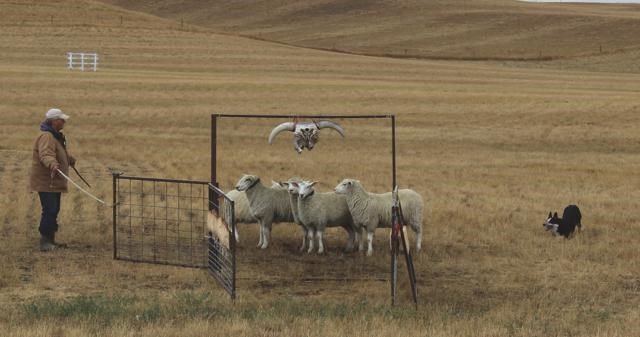All the top dogs were out in Mankota on September 15-17 for the 2017 Western Canadian sheepdog finals. The three-day event featured some of the top sheepdog handlers in North America for the 12th annual Hilltop field trials. Competitors came from Alberta, Saskatchewan and Manitoba. Over 30 well-behaved border collies competed in qualifying rounds over the three days on Doug Williamson’s field near the rodeo grounds.
Day one featured round one of the nursery and open competitions. Day two saw round two of the nursery and open competitions. Day three drew larger crowds to see the top four compete for the nursery title and the top ten open competitors in double lift. The final day also featured the Provincial Driving Contest.
Four-time Western Finals champion Scott Glen of Dayton, Alberta, swept the championship titles, winning with his young border collie Andy in the nursery final, and retaining the open championship with border collie Alice. Ken Makenzie and his dog Angus placed as the reserve champion in the nursery category. Makenzie is known as one of the quietest handlers in Canada. The reserve champion in the open category was Wendy Schmaltz of McCord and her border collie Floss. Saskatchewan, represented by Schmaltz and her dog Ky, won the Provincial Driving Contest.
The Mankota field trials proved to be a tough challenging course for dogs and handlers with plenty of hills, a variety of distances, and complicated driving patterns. Wendy and Chris Schmaltz organized the event in Mankota and provided the sheep for the competition.
The field trial is more challenging because it simulates the handling and working of livestock that occurs on a farm. The dog must gather and drive a flock and assist the handler to separate and pen the sheep as in a farm setting.
The dogs, mostly border collies, are controlled by the handler who has to stand at a fixed spot and guide the dog to control the sheep using a set of whistles and commands. In these trials, the dogs had to make an outrun to find and collect the sheep and guide them back to the handler.
Then, the dogs had to maneuver the sheep around two sets of gates, through pen gates and finally into a shedding ring where the dog has to assist the handler in separating some sheep out from the flock. On the final day, the top competitors competed in a double lift, in which the dog had to find and collect sheep from two different points, then maneuver them and assist the handler is separating out marked ewes in the flock.
Stock dog trials have been around since the 1800s. New Zealand and Australia claim the first trials in the 1860s and the UK held its first trials in 1873 in Wales. The first trial in North American was in 1928. The Western Canadian finals started in 1979 in Souris, Manitoba.
The Western Canadian final was judged by Gordon Watt from Wisconsin, who originally comes from Ireland. Gordon Watt has won the Irish National Competition, world championship and English national championship and his father is a legend in sheepdog handling. The judge is looking for finesse and control as the dog moves livestock through obstacles.
Although border collies are highly intelligent, not all will make it as a sheep dog. Watt likes to see a dog with “an ability to work sheep properly”. This means the dog must use its intelligence, natural instinct and have the right personality. Sheep dog trials have gained public popularity because it is fascinating to watch the small-sized border collies focus and move large flocks of sheep. The dog’s task is not to scare the sheep, says Watt, but to gain the sheep’s trust. Champion handler Scott Glen also looks for border collies with “a good eye”, those who can focus and follow the handler and use their own judgement.
The event was sponsored by Wendy and Chris Schmaltz’s ranch. Each handler and their dog were sponsored by local businesses in the Mankota area.



